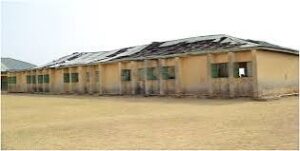The state of Junior Secondary School, Dei-Dei, in the Federal Capital Territory (FCT) paints a grim picture of the challenges plaguing public education in Nigeria. With inadequate funding and a lack of essential infrastructure, the school struggles to provide a conducive learning environment for its 1,590 students hailing from seven communities in the area.

Visiting the school on a morning in early March, news reporters discovered overcrowded classrooms, with students sitting on windowsills and the floor, hindering their ability to focus and learn effectively. Teachers, dedicated to their craft, grapple with the limitations imposed by dilapidated facilities, including a staff room reminiscent of a chicken coop and an absence of basic amenities like fans to combat the scorching heat.
Furthermore, the deplorable state of the school’s toilet facilities forces students and teachers to resort to open defecation and relieving themselves in the bushes, exposing them to significant health risks and contributing to environmental pollution and the spread of diseases. The school’s principal, Mr. Abdullahi Mamma, declined to comment on the situation, leaving the burden of neglect to be voiced by some teachers who lamented the state of government schools in the FCT.
While efforts have been initiated by the Minister of the Federal Capital Territory, Nyesom Wike, to rehabilitate 19 schools, marking a significant stride towards transforming learning environments, urgent action is required to address the pressing infrastructure deficits in public schools. Stakeholders emphasize the need for sustainable options for funding and alternative sources of support outside of government subventions, recognizing that the government alone cannot be solely responsible for funding education.
The Universal Basic Education Board (UBEB) is aware of the inadequacies plaguing the FCT public schools, yet the pressing need for basic infrastructure remains unaddressed. Teachers and stakeholders call on the FCT Universal Basic Education Commission (UBEC) to prioritize providing essential infrastructure to government schools in the Federal Capital Territory to ensure that the standards set by these institutions serve as a model for state public schools.
The United Nations Educational, Scientific and Cultural Organization (UNESCO) defines education as a fundamental human right, underscoring its role in lifting individuals out of poverty, leveling inequalities, and ensuring sustainable development. The neglect of basic infrastructure in schools not only hampers the right to education but also undermines efforts to build a more peaceful, just, and sustainable society.
As the government makes strides in the rehabilitation of schools, the imperative to swiftly complete these renovations resonates deeply, as delays could risk disrupting the academic progress of thousands of public school students. The urgent need for sustainable funding and immediate action to address the structural deficits facing Junior Secondary School, Dei-Dei, underscores the wider systemic challenges that demand attention to ensure that the right to quality education becomes a reality for all.
The plight of Junior Secondary School, Dei-Dei, shines a light on the larger issues facing public education in Nigeria, and urgent steps are required to ensure that the infrastructure deficits in public schools are swiftly and effectively addressed to uphold the fundamental right to quality education for all.




